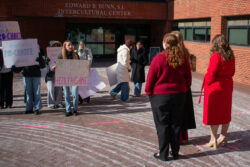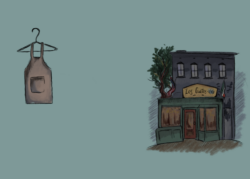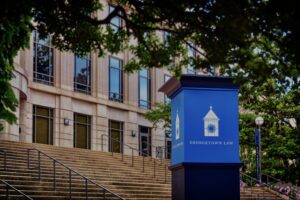A few weeks ago, two Georgetown students engaged in a fight outside of New South that was triggered by the yelling of a racial slur. One student was African-American, the other was of Egyptian descent. Although approximately 30 students witnessed the event, most of whom arrived at the scene after hearing the fight from the Village C patio, the incident was not reported to University authorities. ?
According to one eyewitness, no Department of Public Safety officers showed up to the scene. In essence, only those who were at the scene or those whom they told knew about what had happened, undermining University efforts to prosecute hate incidents. ?
In a separate incident, also a few weeks ago, a group of first-years yelled “Niggers don’t belong at Georgetown!” at two sophomores. One of the students at the butt of the slur was African-American, the other was Asian-American. Again, no DPS officers arrived on the scene, nor was the incident reported to University officials.
Two years ago, the University made “bias-related” violations punishable by its Student Code of Conduct in response to the slew of hate incidents that plagued the campus during the 1999-2000 school year. According to the Code of Conduct, “bias-related refers to Code violations that include language and/or behaviors which demonstrate bias against persons because of, but not limited to, others’ actual or perceived: color, disability, ethnicity, gender, national origin, race, religion, and/or sexual orientation.”
An example of a bias-related code violation is cited as “[a]ny intimidating, hostile, coercive and/or offensive act which is intentional or persistent … which makes use of slurs, phrases, symbols, or conduct … directed at specific individuals … in such a way as to make an individual … feel intimidated or unwelcome.”
According to this statute, the instances described above would be considered punishable bias-related violations of the University Code of Conduct. Since bias-related crimes are considered especially grave, University policy dictates that when such incidents are reported, DPS is to contact all relevant local or federal law enforcement agencies. The Code of Conduct even specifies that DPS should contact local or federal authorities if they merely suspect that the crime may be bias-related. These agencies will then make their own independent investigations into the matter, alongside DPS’ handling of the situation.
While the University’s steps towards dealing with these types of situations are admirable, it is clear that the policies are not effective enough. It is one thing for such policies to exist in the student Code of Conduct, but it is quite another for the University to ensure that all such incidents are reported. As illustrated in the two incidents described above, many students are witness to or are the victims of such incidents and adopt the attitude that “I just want to forget about it” or “someone else will report it.” Unfortunately, most of the time, these types of occurrences never reach the ears of other students, and more importantly, of administrators.
This year’s seniors are the last class to have witnessed firsthand the string of hate crimes that hit Georgetown three years ago. What made the administration act then was the reporting of such crimes to the appropriate authorities, and it is only this that will make the administration act now.
Sadly, incidents such as the ones above are almost a daily occurrence?and they vary from lesser to greater degrees. While it may be impossible for every single incident to be reported, students need to start taking responsibility. Three years later, we need to show the administration that we still have “no tolerance for intolerance.”




